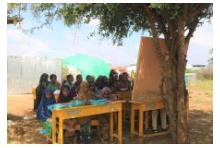Help UNICEF Reach the 45 Million Children at Risk in Eastern and Southern Africa
op UNICEF USAOutbreaks of health crisis and intensification of the effects of climate change have left thousands of children in Southern and Eastern Africa in vulnerable situations. Since October 2023, the El Niño weather phenomenon has led to extreme floods throughout East Africa, including in Burundi, Kenya, and Ethiopia. In Burundi alone, the lives of 203,944 people have been severely disrupted, leading to the displacement of over 98,000 individuals and the destruction of nearly 20,000 homes.
The flooding emergency comes at a time where the region is already grappling with one of the worst cholera outbreaks in decades, with cases rapidly spreading across the region. Zambia and 17 other countries in the region have been struggling with a cholera outbreak that has surpassed 348,600 cholera cases since the beginning of 2023. A recent new drought in Zambia has only worsened the situation, leading to increased vulnerabilities for families and communities. The El Nino phenomenon present the perfect storm with regards to risk posed to children: floods, cholera and displacement coupled with serious epidemic outbreaks.
UNICEF is on the ground working closely with government counterparts and local partners to assess the situation and strengthen the response to ensure children and families are protected and supported. UNICEF interventions provide education, nutrition, health, WASH, and protection support to children and families across the region. UNICEF’s lifesaving response is focused on:
• Prepositioning relief items in floods prone areas in preparation and coordinating with local partners on the ground
• Enhancing access to potable water and increasing adaptation capacities in communities vulnerable to drought and flood-prone areas through the installation of a sand dam
• Water, Sanitation & Hygiene (WASH): Providing access to clean water for drinking and domestic needs and access to appropriate sanitation services
• Nutrition Interventions and support with oral cholera vaccination (OCV) campaigns
• Education: Working with governments to keep schools safely open to allow for continued learning in a protective environment.
UNICEF remains present to assess the situation and the needs of children. With your support, UNICEF can continue its crucial work to help affected families. Thank you.
